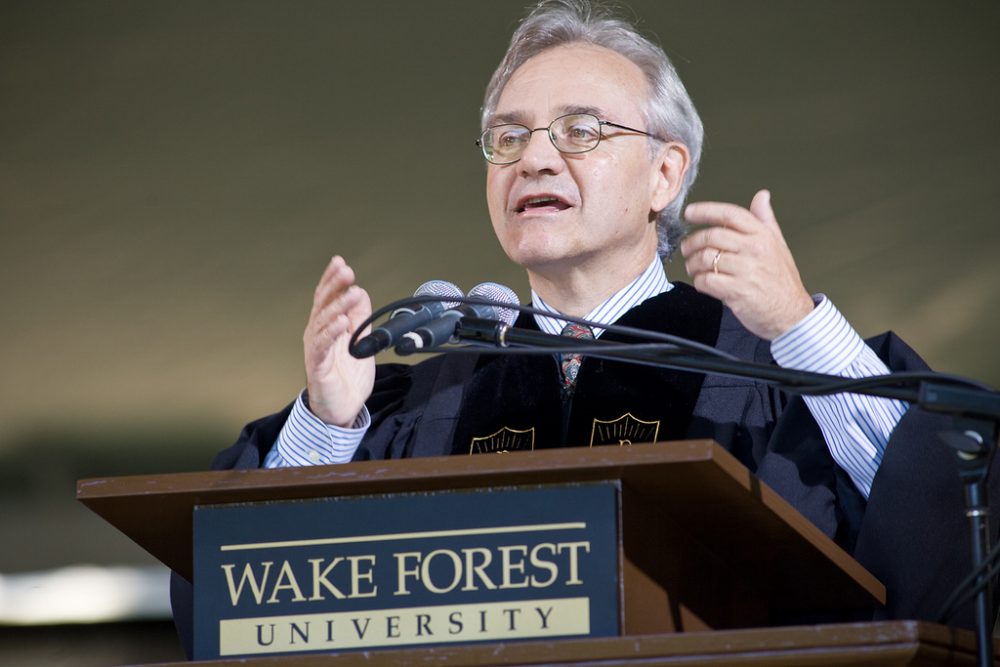2008: Press release
Washington Post’s E.J. Dionne calls 2008 graduates part of next ‘greatest generation’
Posted May 19, 2008

Washington Post columnist E.J. Dionne Jr. predicted in his commencement address to Wake Forest University’s 2008 graduating class that they are part of a group that will become the next “greatest generation.”
Dionne’s comments garnered an enthusiastic response from the crowd of about 15,000 people, which included families and guests of the 1,565 students receiving diplomas during an outdoor ceremony held under sunny skies on Hearn Plaza May 19. Afterward, Dionne received an honorary doctor of humane letters degree.
“Your generation is poised to become one of the great reforming generations in our country’s history – if you decide to take on this challenge,” Dionne said. “. . . Fifty years from now, I want the person standing in my place, talking to the Wake Forest class of 2058, to be able to say that you, the class of 2008, were part of the greatest generation that transformed a time of perils and confusion into an era of reform and renewal. And I actually think that you’ll do it.”
Dionne explained that he drew the title of his address, “The Reform Generation and History’s Mysterious Cycle,” from a speech Franklin D. Roosevelt gave at the 1936 Democratic National Convention, at which Roosevelt said “There is a mysterious cycle in human events. To some generations much is given. Of other generations much is expected. This generation of Americans has a rendezvous with destiny.”
“I believe those words apply more truly to your generation than to any other since FDR addressed them to what came to be known as the greatest generation,” Dionne said.
He observed that the generation of young people graduating from colleges today has been exceptionally devoted to serving others, volunteering as tutors and mentors, working in soup kitchens and homeless shelters, and joining community organizations and environmental programs.
“You combine the idealism of the 1960s with the practical concerns of the generations of the 1980s,” Dionne noted, adding that they have the opportunity to restore faith in public institutions that has been eroding since the Vietnam War and Watergate.
What makes the current generation of young people special, Dionne asserted, is their willingness to face the problems they are inheriting with hopefulness tempered by realism.
“No, hope is not naïve,” Dionne said. “Hope accepts the human tendency to sin, but also our capacity for transcendence. Hope is realistic about what is, but imagines what might be. Hope sees through empty cynicism and sees around the corners of our current difficulties. Hope is the virtue on which faith and love depend.”
In his speech, Dionne offered graduates several conventional lessons. He advised them that “daring to fail is the only way to succeed,” buttressed by a reminder that baseball’s best hitters routinely fail 70 percent of the time. He also urged graduates to cultivate a sense of humor, especially about themselves and to avoid treating with disrespect anyone with less formal education.
“You earn respect by respecting others,” he said, “and you learn by remembering that every single person on this earth — rich or poor, formally educated or self-educated — knows things you don’t know and can teach you things you need to know.”
After his address, Dionne shook hands with each graduate crossing the stage, and many expressed their appreciation for his remarks.
Dionne is the sixth journalist to deliver the commencement address since Wake Forest relocated to its Reynolda Campus in Winston-Salem in 1956. New York Times columnist David Brooks spoke last year. Others include Wallace Carroll, Judy Woodruff, Ben Bradlee and Bill Moyers, who has delivered the address twice.
E.J. Dionne Jr. Audio
- 2008: Main story
- 2008: Speaker E.J. Dionne Jr.
- 2008: Press release
- 2008: Honorary Degrees
- 2008: Retiring: Andronica
- 2008: Retiring: Kerr
- 2008: Retiring: Knott
- 2008: Retiring: Mandelbaum
- 2008: Retiring: Bowman Gray campus
- 2008: Senior oration: Cowan
- 2008: Senior oration: Haley
- 2008: Senior oration: Lazazzero
- 2008: Senior profile: Carroll
- 2008: Senior profile: Catanese
- 2008: Senior profile: Cooper
- 2008: Senior profile: Frazier
- 2008: Senior profile: Lopez
- 2008: Senior profile: McGuire
- 2008: Senior profile: Mullikin
- 2008: News: Beshara
- 2008: News: Chauvenet
- 2008: News: Fulbrights
- 2008: News: Jones
- 2008: News: Phi Beta Kappa
- 2008: News: Scott
- 2008: News: Warren
- 2008: Commencement Photos
- 2008: Video: Speaker
- 2008: Video: Ceremony
- 2008: Video: Time-lapse
- 2008: Video: Baccalaureate
- 2008: Baccalaureate Photos
- 2008: By the numbers
- 2008: Programs
